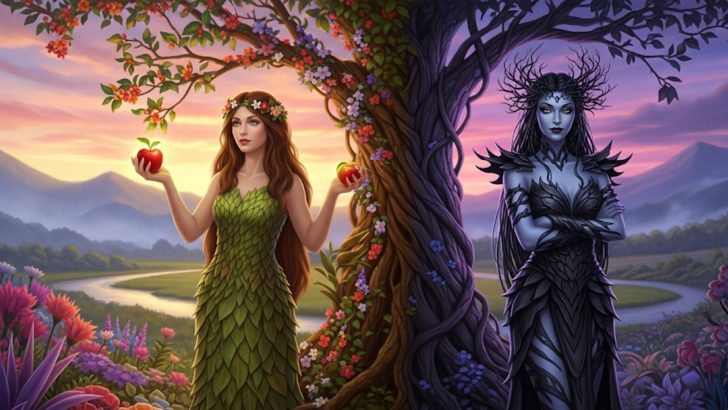They’re both called the first woman, but depending on who you ask, only one of them makes it into the official Sunday school curriculum.
Lilith and Eve represent two wildly different visions of womanhood: one fierce and unbending, the other nurturing and obedient.
But which version is closer to truth? Or is it possible that both have been edited, softened, or even twisted to fit someone else’s agenda?
Comparing Lilith and Eve isn’t about deciding who’s better, it’s about understanding how culture, religion, and myth have shaped our ideas of women for thousands of years.
These two figures may have come from the same garden, but they tell very different stories. Let’s dig into the key differences between the rebel with wings and the woman with an apple.
1. Lilith Was Independent from the Start – Eve Was Dependent by Design
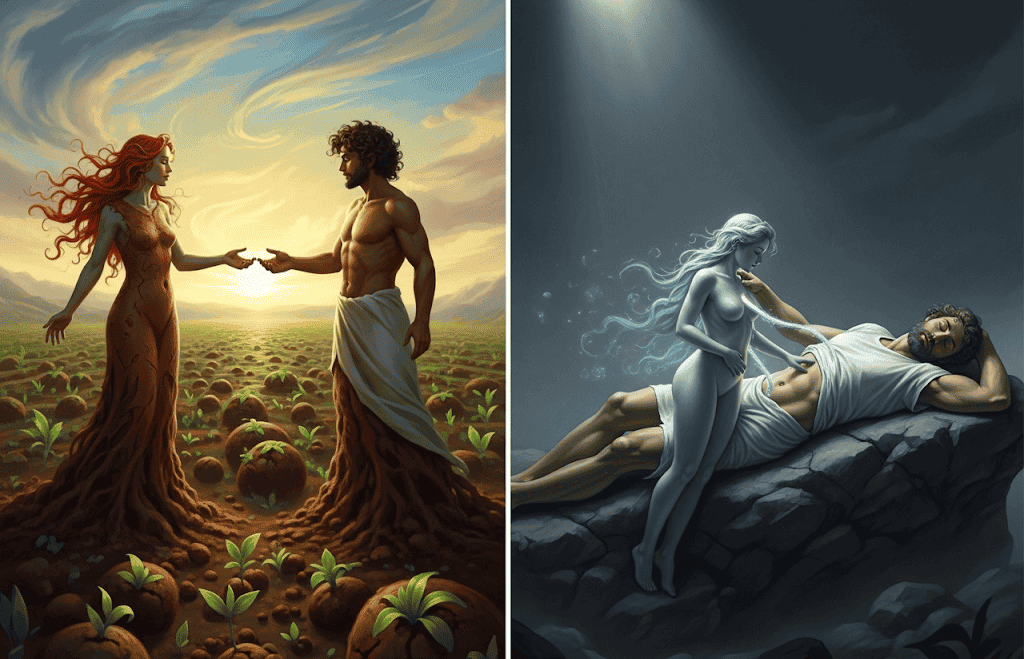
Lilith was made from the same earth as Adam, equal in form and origin. Eve, on the other hand, was created from Adam, fashioned from his rib while he slept.
That difference may seem symbolic, but it’s huge. Lilith’s story begins with equality and ends with her demanding to be treated as such.
Eve’s story begins in submission and ends in partnership, after a fall, a punishment, and a whole lot of consequences.
Lilith never needed Adam to define her. Eve literally wouldn’t exist without him. The takeaway? Lilith stands for selfhood.
Eve was created to support. That foundational difference continues to shape how these two women are seen even today.
2. Lilith Said “No” – Eve Said “Yes”
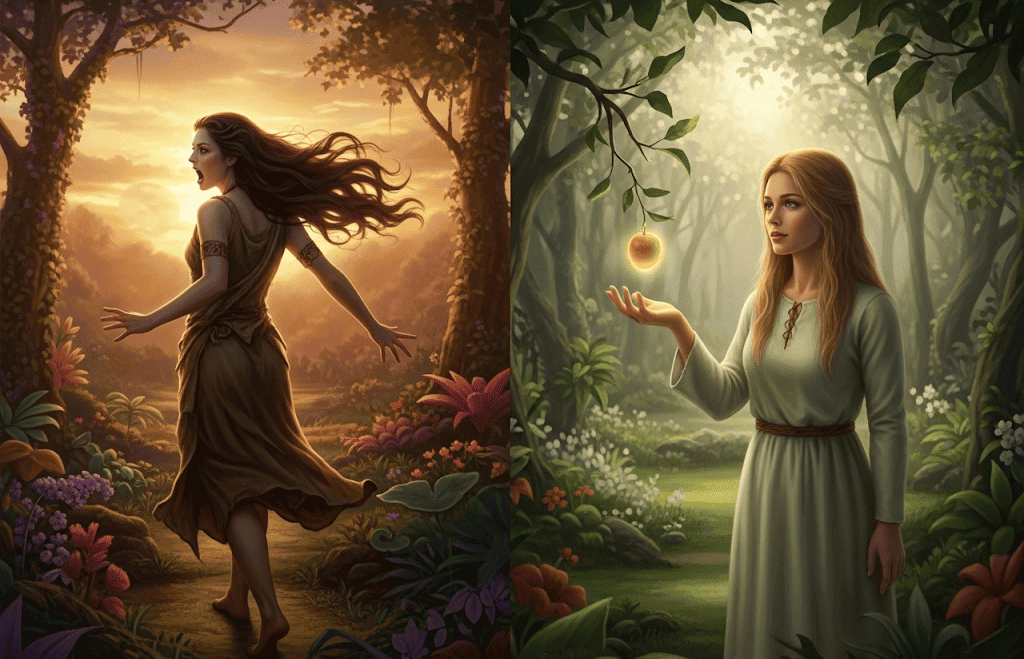
One of the boldest differences between Lilith and Eve is how they handled being told what to do.
Lilith’s defining moment was saying no—to Adam, to submission, to a life that didn’t feel right. She left.
Eve, however, said yes—to the serpent, to the fruit, to stepping into knowledge. While both decisions had consequences, one came from resistance and the other from curiosity.
Lilith rejected the system; Eve played within it and challenged it from the inside. Lilith’s “no” was loud and fiery.
Eve’s “yes” was whispered and fateful. They were both powerful, but they wielded that power in very different ways.
3. Eve Was Punished – Lilith Left on Her Own Terms

When Eve disobeyed, she was punished—pain in childbirth, exile from Eden, a life of toil. Her story is one of mistakes and consequences.
Lilith, by contrast, didn’t wait around to be punished. She left before the conflict could be resolved, choosing exile over submission.
That choice to walk away gave her power, but it also made her dangerous in the eyes of tradition. Eve fell. Lilith flew.
And that’s a very different narrative. One was banished for her actions, the other chose her freedom, no matter the cost.
Lilith may have been demonized, but she never played the victim. Eve bore the weight of humanity’s fall. Lilith carried her own wings.
4. Lilith Represents Autonomy – Eve Represents Relationship
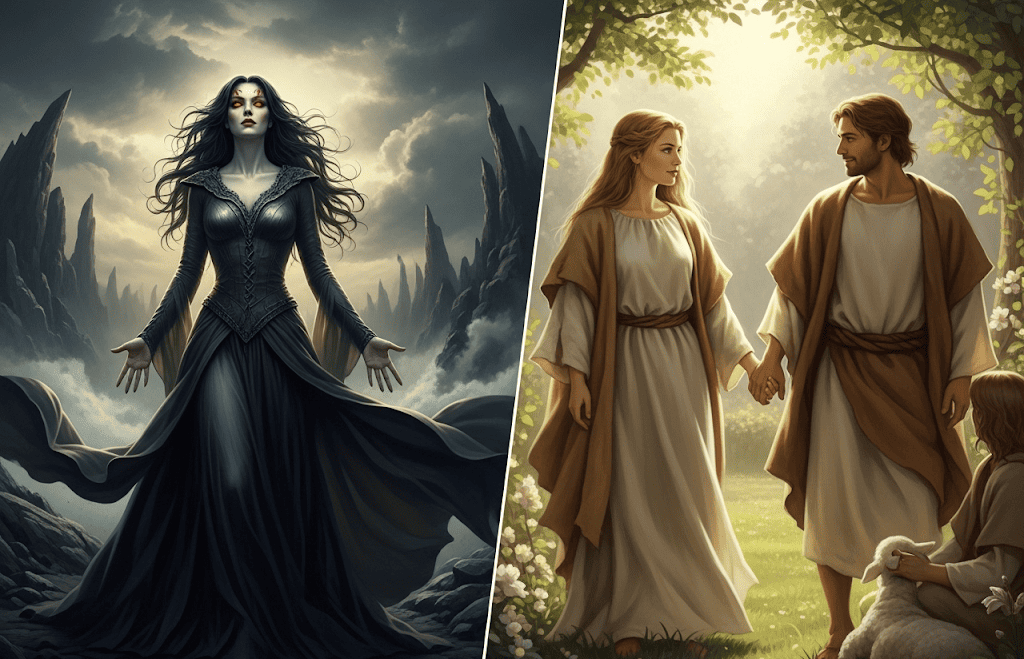
Lilith’s myth revolves around self-definition. She didn’t want a man to lead her, love her, or complete her. Her story is about identity without attachment.
Eve’s story, though, is deeply relational. She’s introduced as a companion for Adam and becomes the mother of all humanity.
Her identity is woven into family, marriage, and lineage. That’s not a flaw, it’s just a different kind of strength.
Lilith teaches the power of being whole on your own. Eve teaches the strength of navigating love, loss, and consequence.
One says, “I choose me.” The other says, “Let’s do this together.” And both voices matter in the human story.
5. Eve’s Legacy Was Preserved – Lilith’s Was Buried
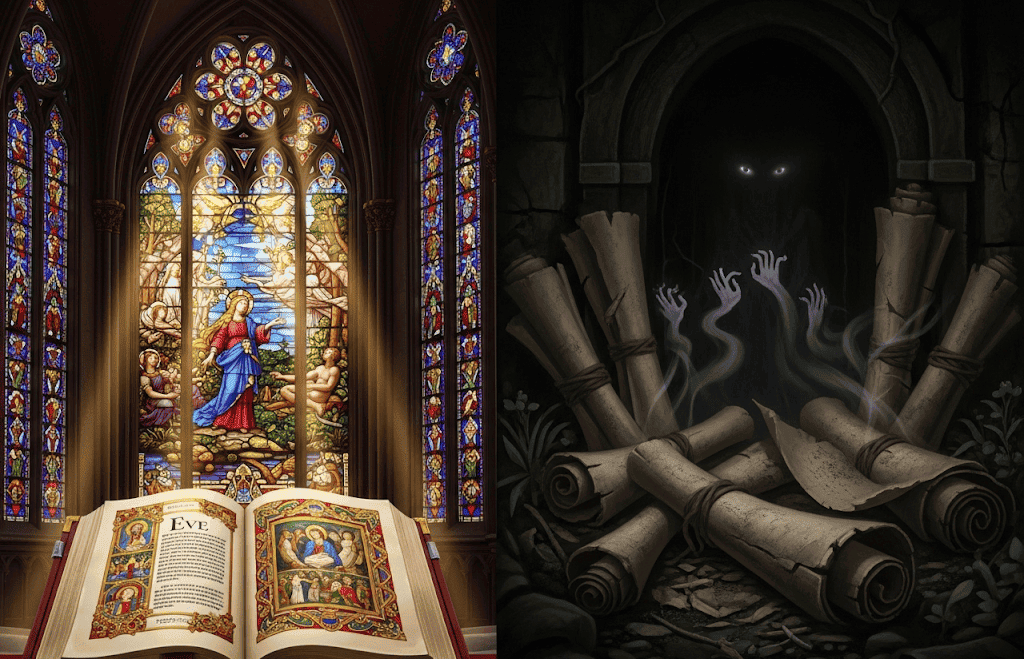
Eve’s name was etched into the core of religious history. She’s in every Bible, every church window, every childhood story.
Lilith? Not so much. Her legacy was scattered—hidden in forgotten books, whispered in night stories, and eventually twisted into demonic myths.
Eve was protected, sanitized, and sanctified. Lilith was feared, edited out, and misunderstood. The result? Eve became the “first woman” in collective memory, while Lilith became a shadow.
But today, we’re dusting off that shadow and asking questions. Why was one preserved and the other buried?
What were we supposed to forget? Maybe the answer lies in what Lilith represents: a woman who wouldn’t obey, apologize, or fade quietly.
6. Lilith’s Story Is About Freedom – Eve’s Is About Obedience
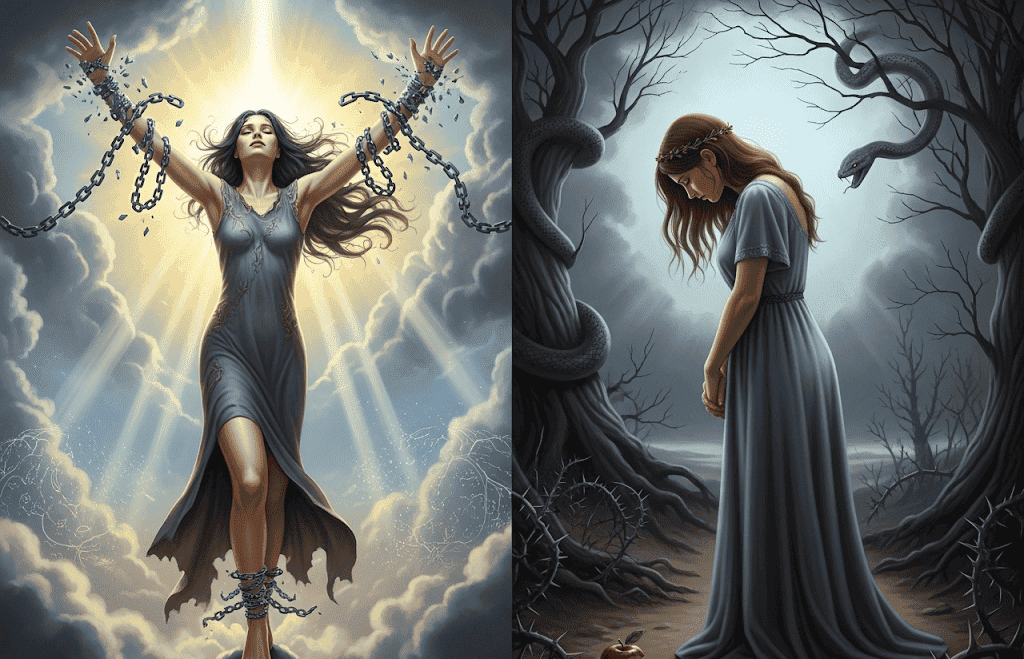
Lilith’s main storyline hinges on freedom—her right to choose, to leave, to be her own person. She didn’t follow divine instruction; she broke away from it.
Eve’s story, meanwhile, revolves around obedience. Her “failure” comes when she disobeys. Her punishment is tied to the idea that she overstepped.
These opposing arcs reveal how different cultures view women’s choices. Is the ideal woman free—or obedient? Powerful—or protected?
Lilith is often celebrated now as a figure of liberation, while Eve is more complicated, a cautionary tale and a mother figure rolled into one.
7. Eve Was Human – Lilith Was Something More
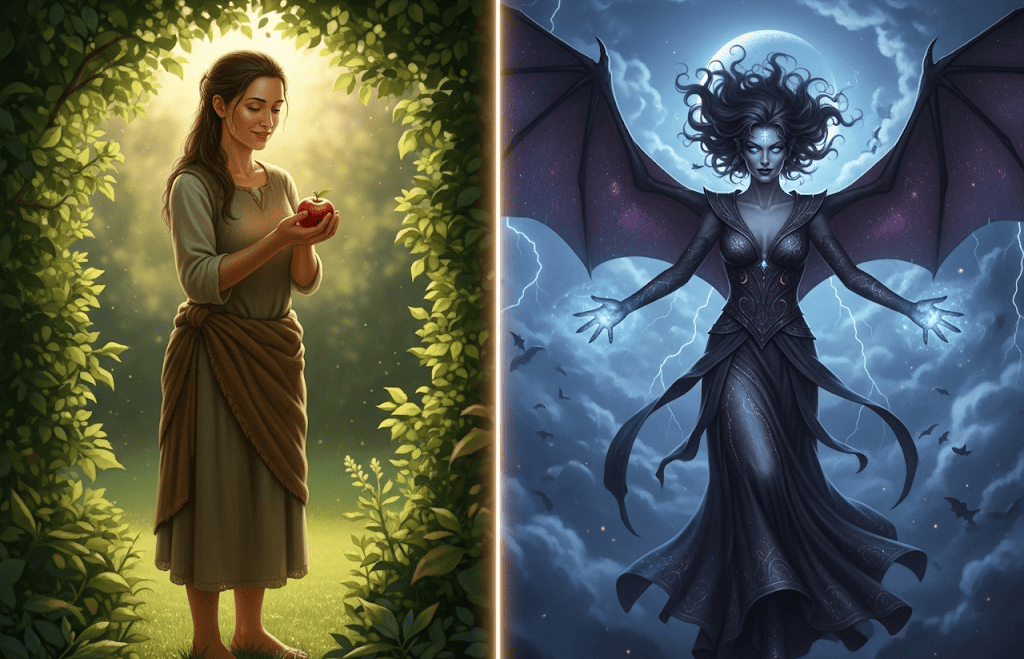
Eve is portrayed as fully human. She walks, talks, loves, suffers, and gives birth. She’s relatable in her flaws and her pain.
Lilith, on the other hand, feels more mythical. She flies, shapeshifts, and possibly even speaks divine names. She’s part woman, part symbol, part force of nature.
That supernatural flair makes Lilith feel untouchable, more like a goddess or spirit than a person. Eve is us at our most vulnerable.
Lilith is us at our most untamed. And while Eve’s humanity makes her easy to empathize with, Lilith’s mystery pulls us in, challenges us, and dares us to imagine more.
8. Lilith Was Erased by Men – Eve Was Written by Them

Lilith’s story was removed or buried because it threatened the patriarchal structure being written into sacred texts.
Eve’s story, however, was carefully constructed by men to teach certain lessons about obedience, temptation, and gender roles.
Eve was created for narrative usefulness. Lilith was too unpredictable to be tamed by storylines. She didn’t serve the moral, so she got the boot.
In that way, their destinies were shaped by the same hands just in opposite directions. One woman was edited to fit the script. The other was edited out of it.
9. Eve Was Blamed – Lilith Was Feared
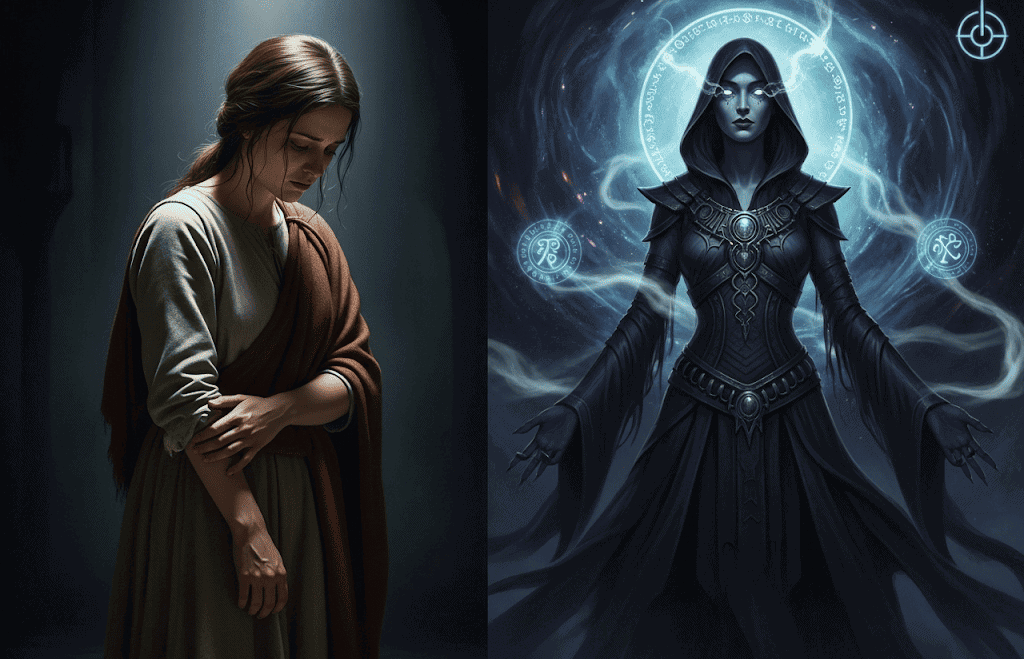
Eve became the scapegoat for humanity’s downfall. “Thanks a lot, Eve,” was the running narrative for centuries. She ate the fruit, got kicked out of Eden, and passed down the burden of sin.
Lilith, however, wasn’t blamed; she was feared. Her name was invoked to ward off evil, protect infants, and scare children into behaving.
While Eve carried the burden of shame, Lilith carried the weight of fear. One was the reason the world changed. The other was the reason your baby cried at night.
Neither got a fair deal, but their reputations reflect how differently defiance and curiosity were treated in myth.
10. Lilith Was Silenced – Eve Was Heard, Then Judged
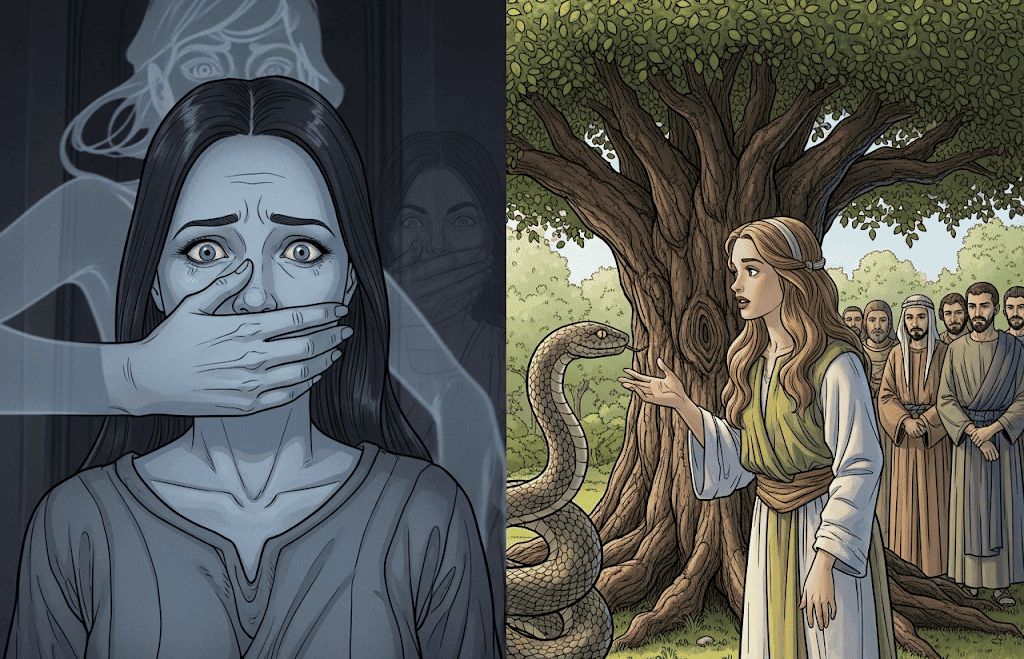
Eve had a voice in the story. She spoke to the serpent. She debated. She made a choice and paid dearly for it.
Lilith, in contrast, was given a voice in earlier myth but then silenced in official scripture. Her words were removed, her presence denied.
One woman was judged for speaking; the other was punished by being erased. That tells us a lot about how ancient texts handled women with opinions.
Speak, and you might be shamed. Refuse to play the game, and you might be cut from the story entirely. Both fates are harsh, but they also remind us of the resilience it takes to have a voice, then and now.

Ho sempre sentito una forte connessione con il Divino fin dalla mia nascita. Come autrice e mentore, la mia missione è aiutare gli altri a trovare l'amore, la felicità e la forza interiore nei momenti più bui.

